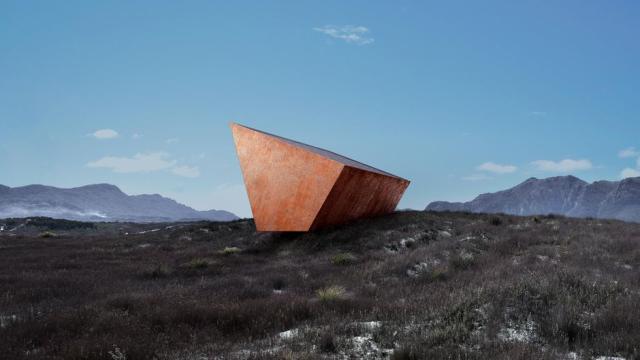A monolithic data storage site and art installation called “Earth’s Black Box” is slated for construction in Australia. Akin to a flight recorder, the device is meant to chronicle Earth’s journey toward environmental destruction, but it likely won’t have much of an impact.
The 10-metre structure will be built on a remote granite outcrop in western Tasmania, Australia’s ABC News reports. Its 7.5-centimetre steel casing will protect internal storage drives packed with troves of “data sets, measurements and interactions relating to the health of our planet,” according to the Earth’s Black Box website. This data will be collected continuously and stored for future use.
Connected to the internet, the structure will aggregate existing measures of ocean and land temperatures, atmospheric carbon dioxide, changes to land use, energy consumption, and population growth, among other data, says ABC News. It’ll also grab and store news headlines, trending social media posts, and developments from climate change meetings. The system will also work back in time, building a historical record of climate change.
“The purpose of the device is to provide an unbiased account of the events that lead to the demise of the planet, hold accountability for future generations, and inspire urgent action,” according to the website. “How the story ends is completely up to us.”
Solar panels on the roof will provide the needed energy, while batteries will store the backup power. Earth’s Black Box will reportedly store nearly half a century’s worth of data, but the developers are hoping to store even more. Ideally, the system will preserve data for hundreds and possibly even thousands of years, ABC News reports. Earth’s Black Box is yet to be built, but a conceptual image shows what the completed structure will look like. Rising up from the granite floor, the object’s sharp angles will provide a stark contrast against its natural surroundings, while its odd geometric proportions will make it appear differently from every angle. As an art piece, it’s actually quite interesting.
Teams from the University of Tasmania, Clemenger BBDO (a communications firm), and the Glue Society (an art collective) are taking part in this non-commercial project. Candidate sites included Malta, Norway, and Qatar, but Tasmania was ultimately selected due to its favourable geopolitical and geological stability, according to ABC News. Construction is slated to start mid-2022, but the system is already in record mode, which started during the recently concluded COP26 climate conference in Scotland.
Speaking to ABC News, Jim Curtis of Clemenger BBDO described Earth’s Black Box as a tool, but a tool that will be “built to outlive us all.” Should our planet go to crap and our civilisation along with it, “this indestructible recording device will be there for whoever’s left to learn from that,” he added.
The developers are hoping to make the data decipherable to whoever should discover it in the future, whether they be from future generations or from an alien world. On that note, the team is considering a plan to transmit the collected data to space, according to ABC News.
As its name suggests, Earth’s Black Box is supposed to be like a flight recorder, but I see it more as social commentary and as a cool-looking art installation. A future civilisation might find some of this data useful, but I doubt it. The message is already crystal clear: It’s the fossil fuels, stupid.
This project is reminiscent of the Svalbard Global Seed Vault, but unlike the precious seeds in this northern Norwegian vault, the data to be stored within Earth’s Black Box doesn’t seem inherently useful, or at least not to me. Future climate modelers and historians may disagree, though I suspect they’ll be able to get their data from other sources. Today’s climate scientists already do, in fact, and there’s no reason to think that those sources of data would somehow be unavailable to future researchers. What’s more, the Svalbard vault is already capable of storing data, so the new project seems a bit redundant.
The project warns that “climate change and other man-made perils will cause our civilisation to crash.” That second part makes the focus solely on climate data feel a bit off. I’m not dismissing the risks of unfettered fossil fuel use, but not naming the other existential threats, let alone chronicling the data for them feels shortsighted. Those perils include bioengineered viruses, molecular nanotechnology, nuclear armageddon, and artificial superintelligence. A flight recorder inherently documents whatever happens to a plane when it goes down; why wouldn’t the Earth-focused version do the same?
So while I like this project, I don’t love it. Maybe I’ve become too cynical about these things, but it’s not clear to me that this project, despite its laudable message, will actually make any sort of measurable impact, now or in the future.
